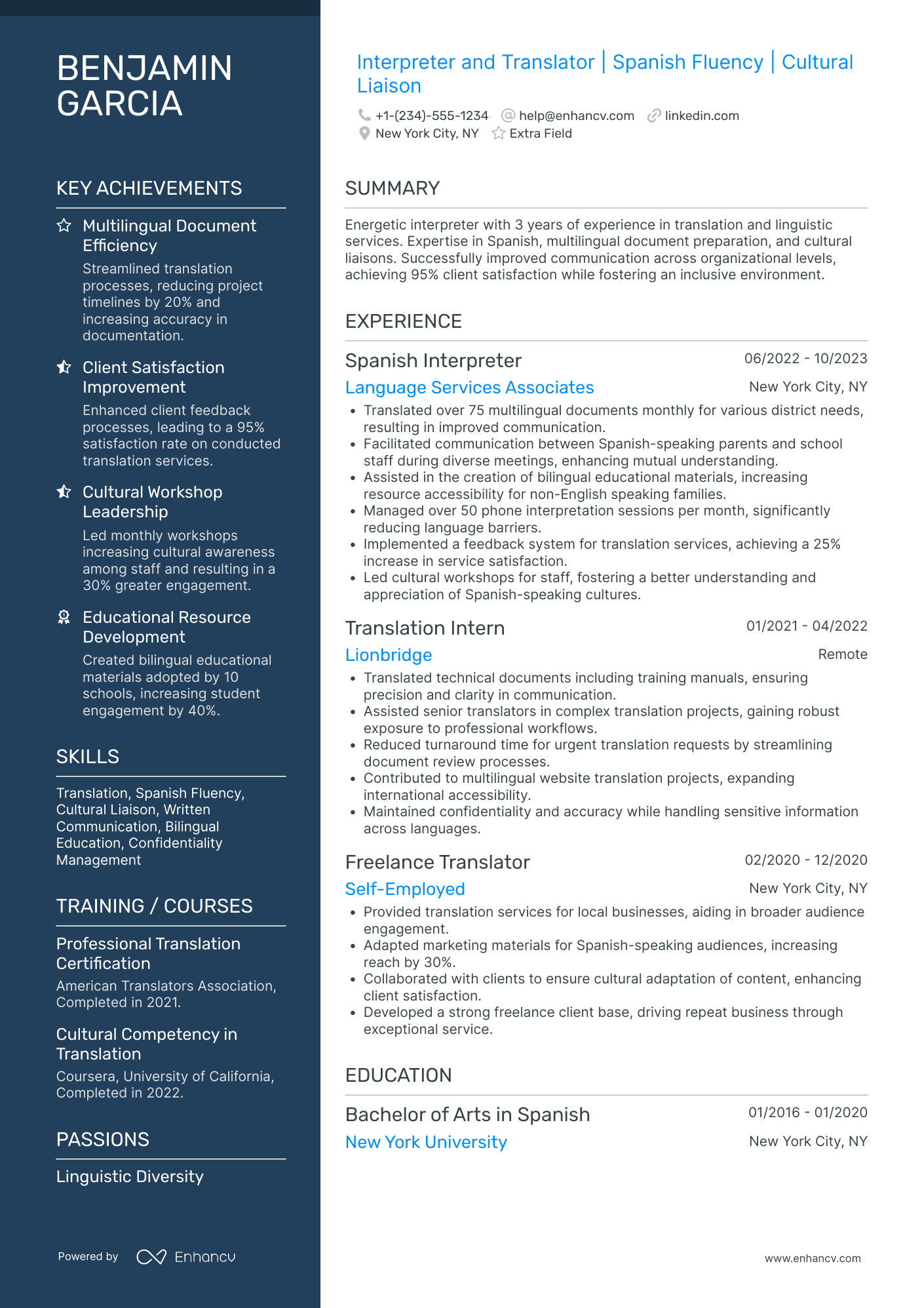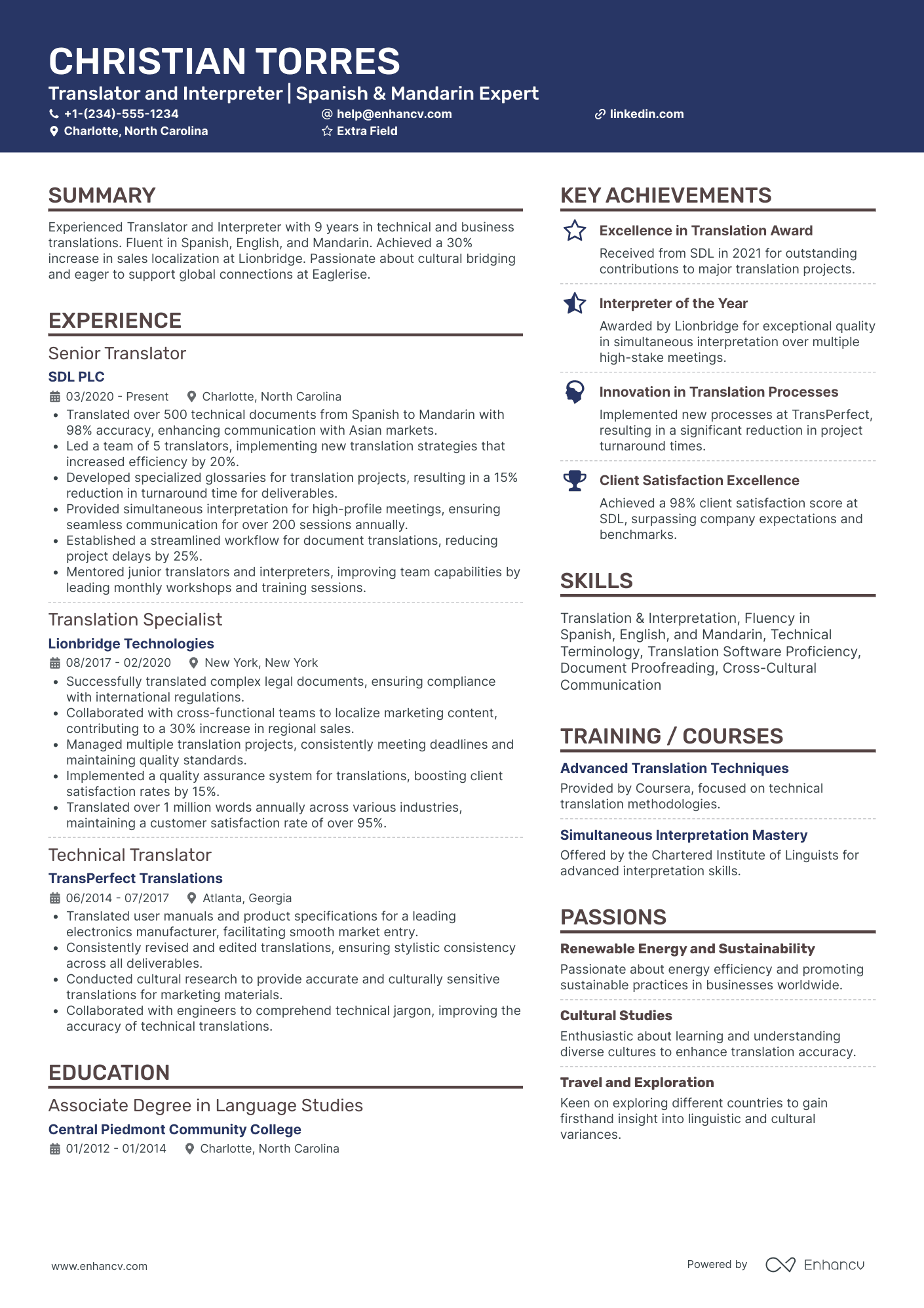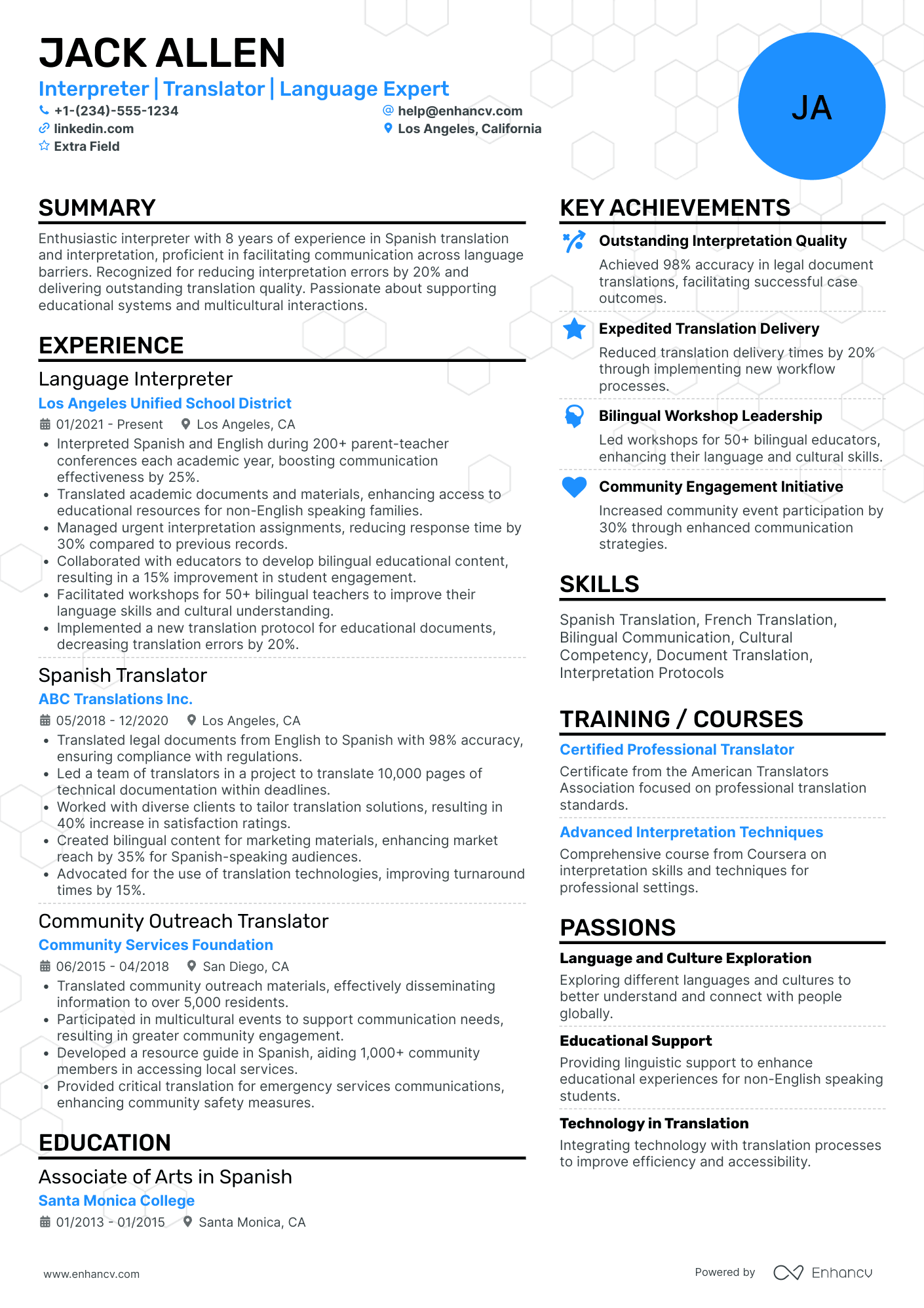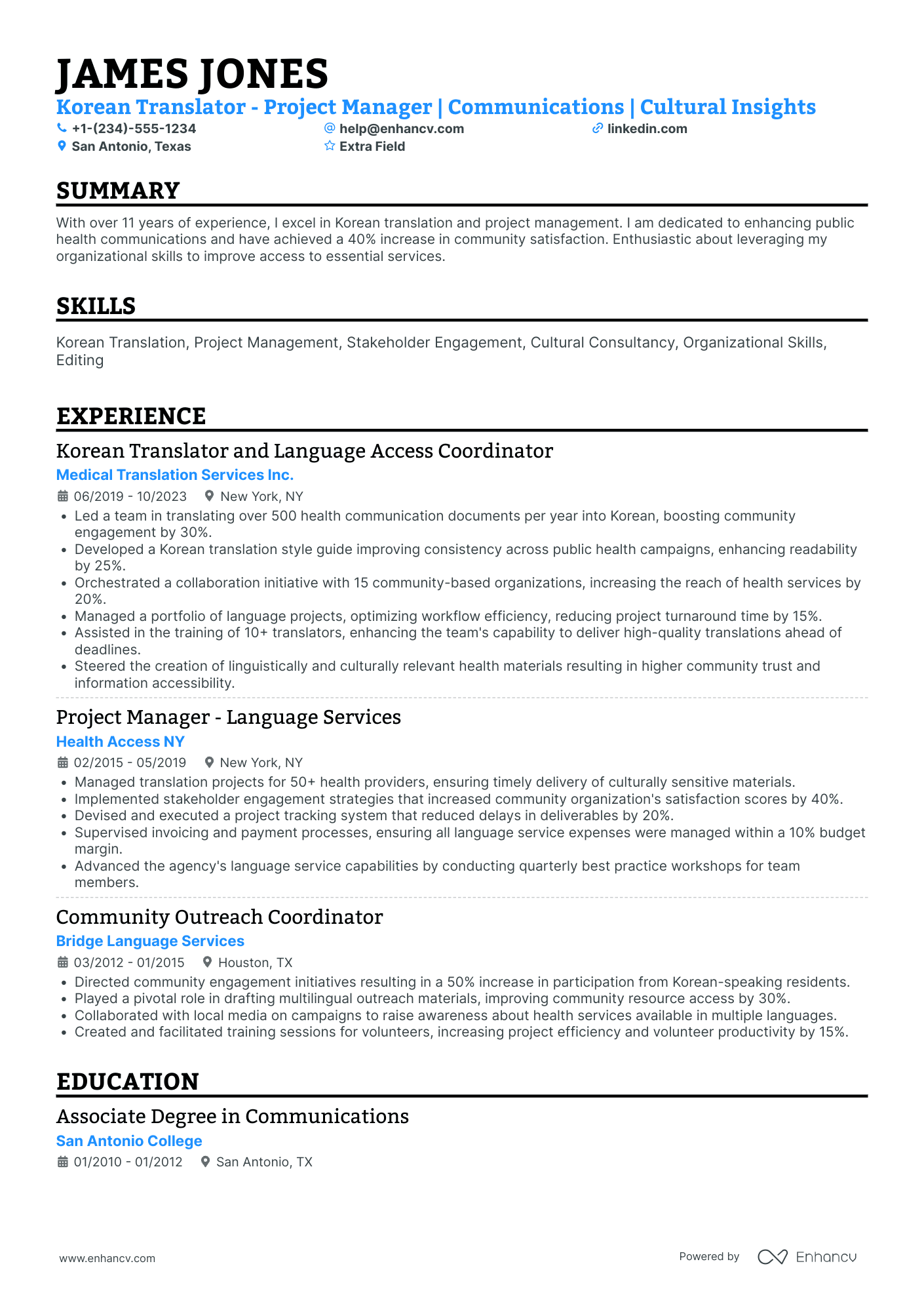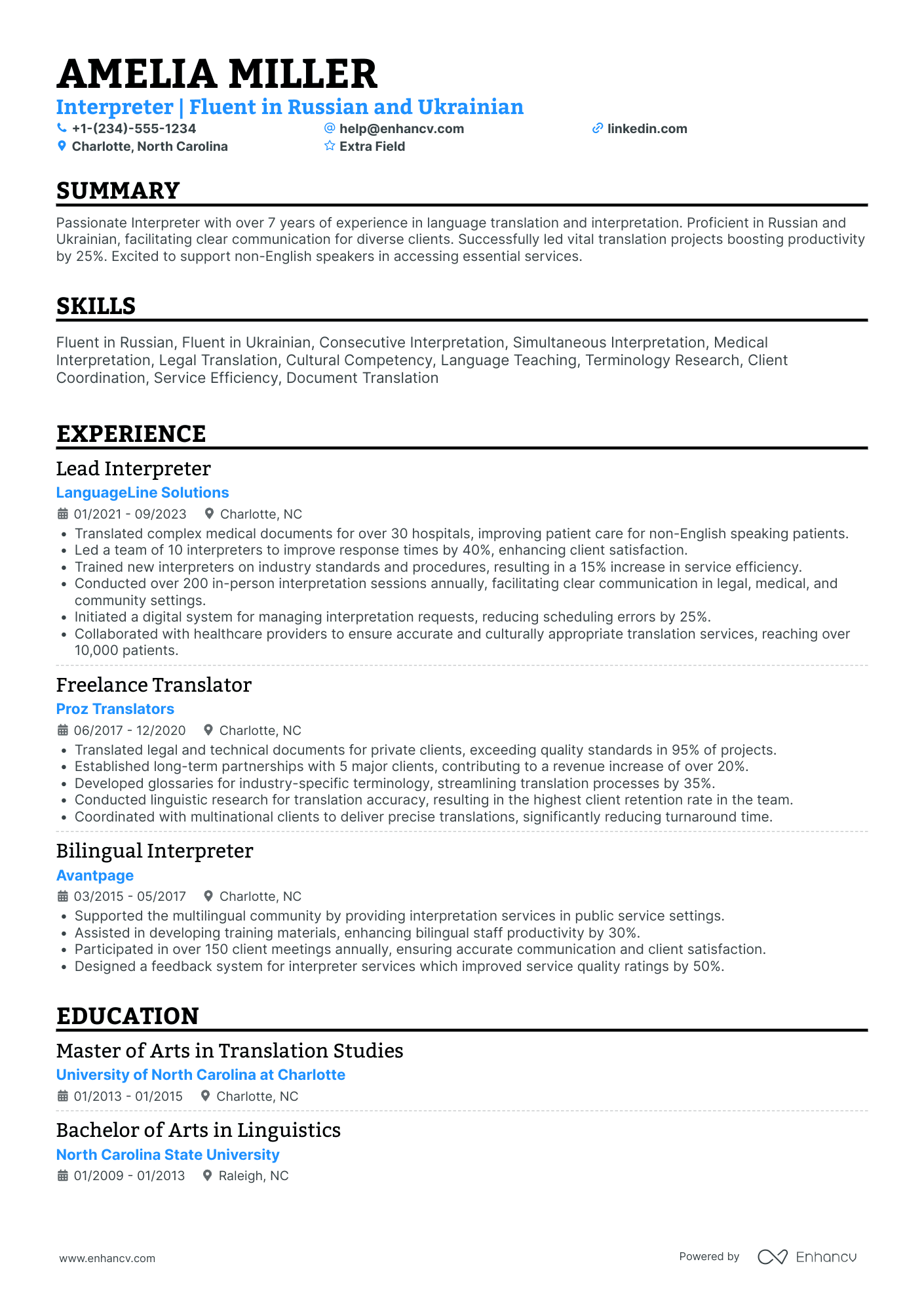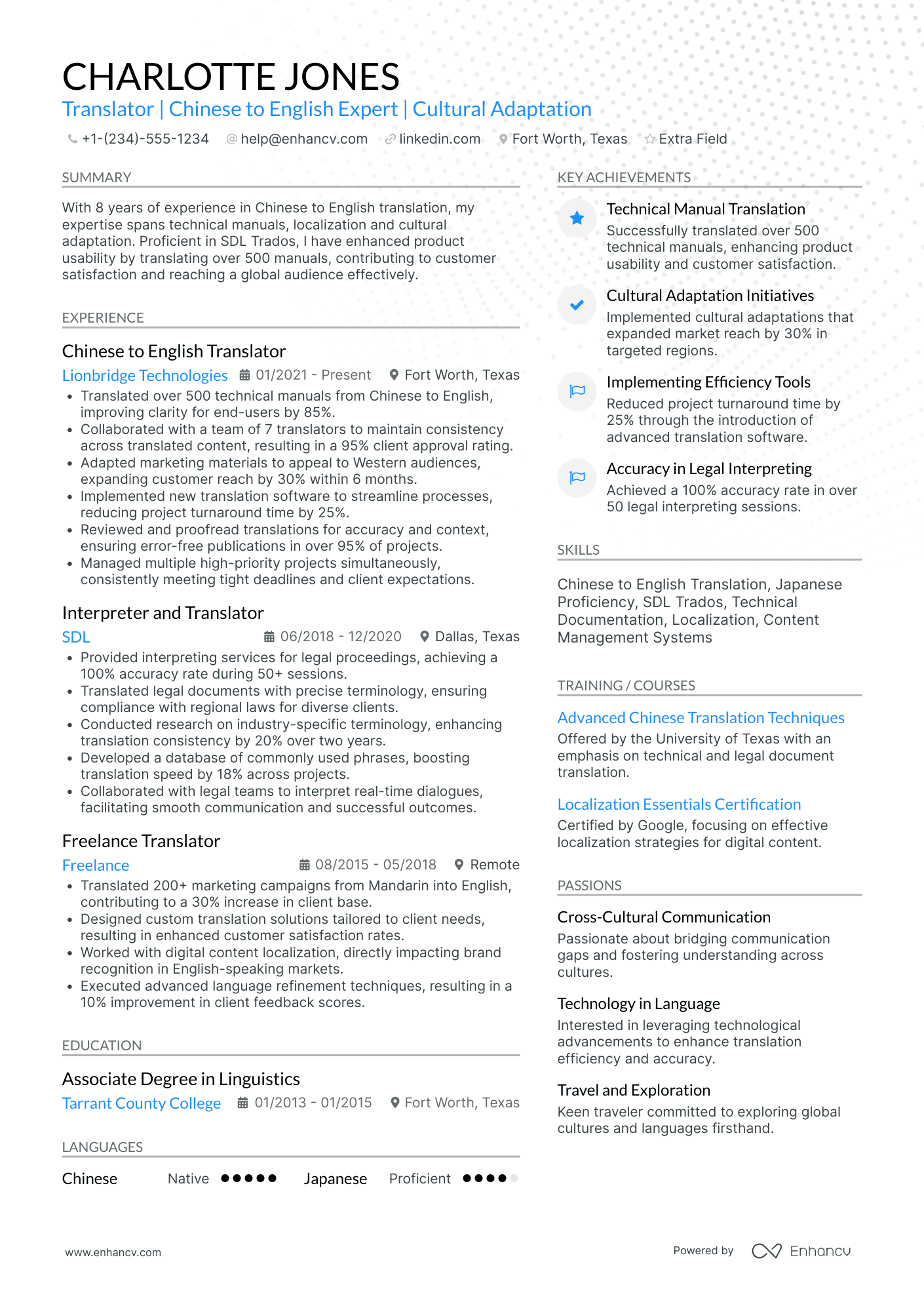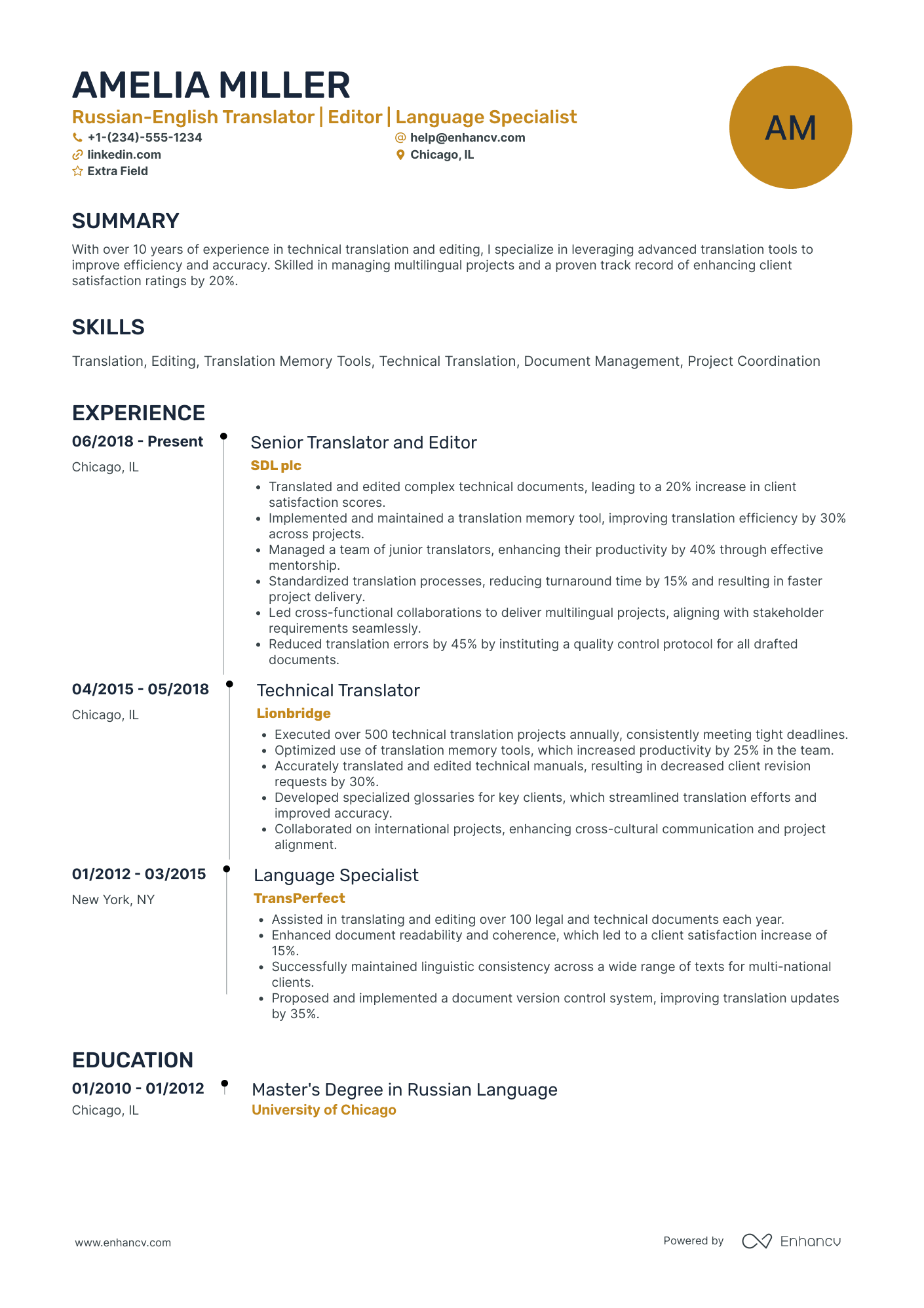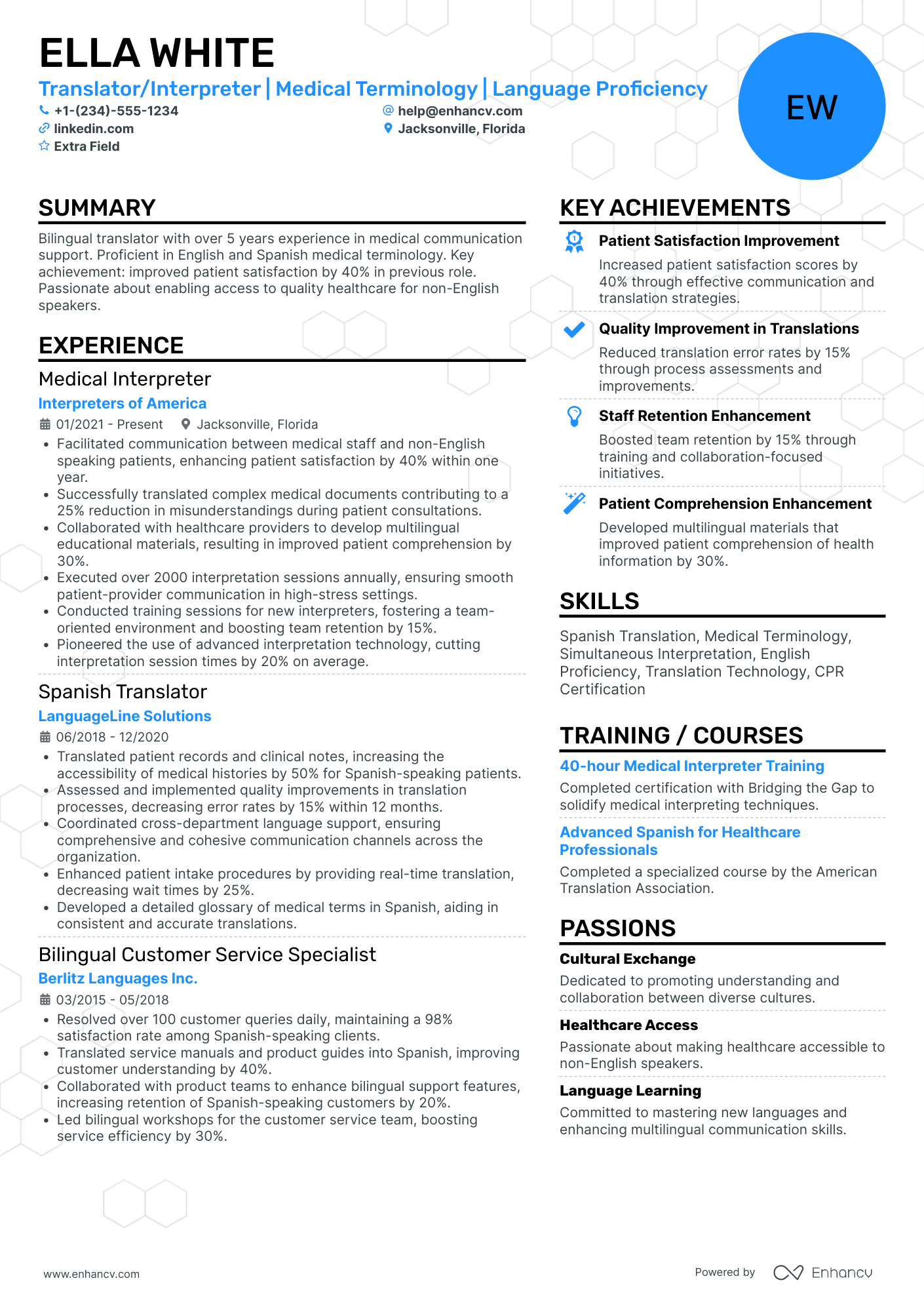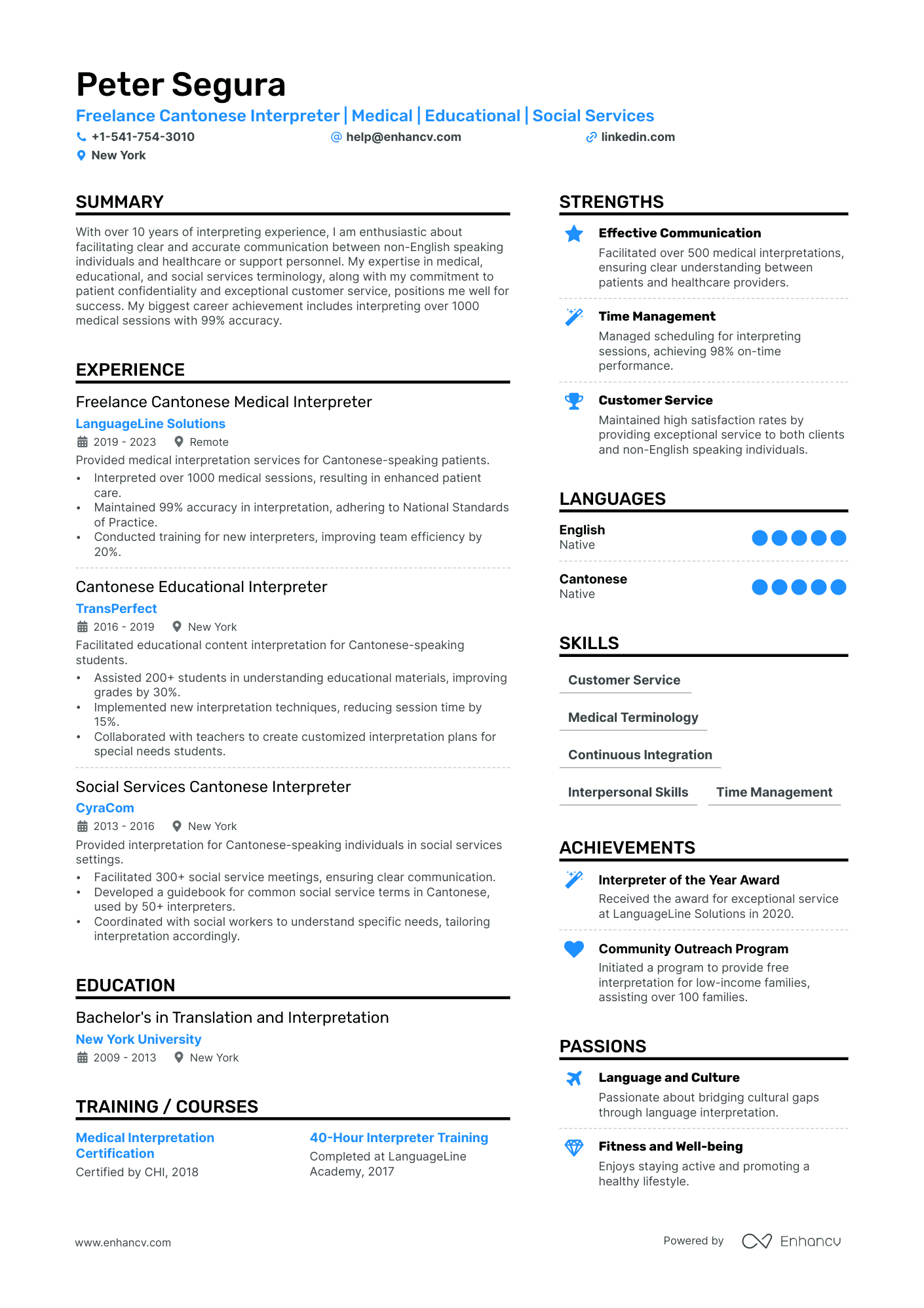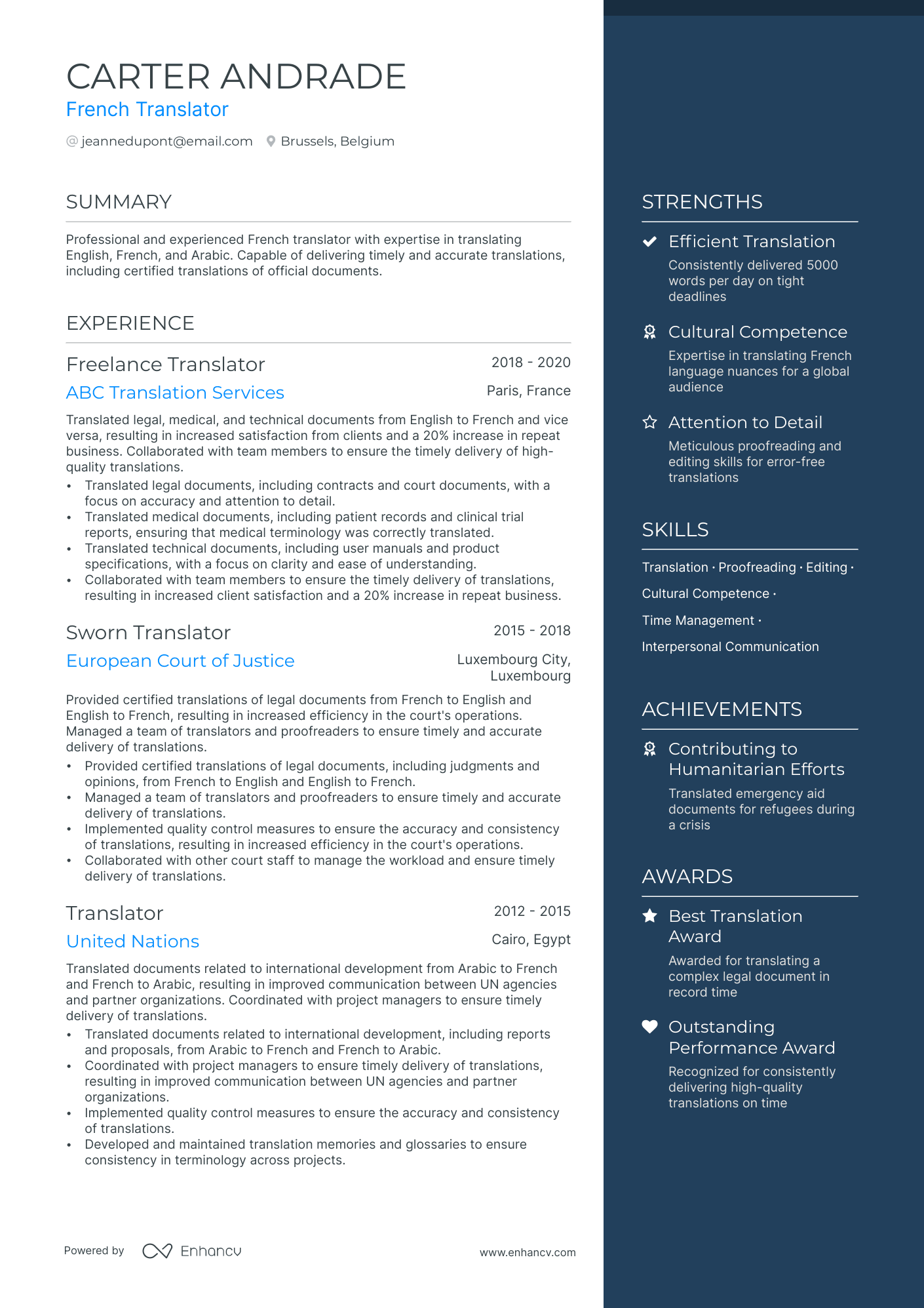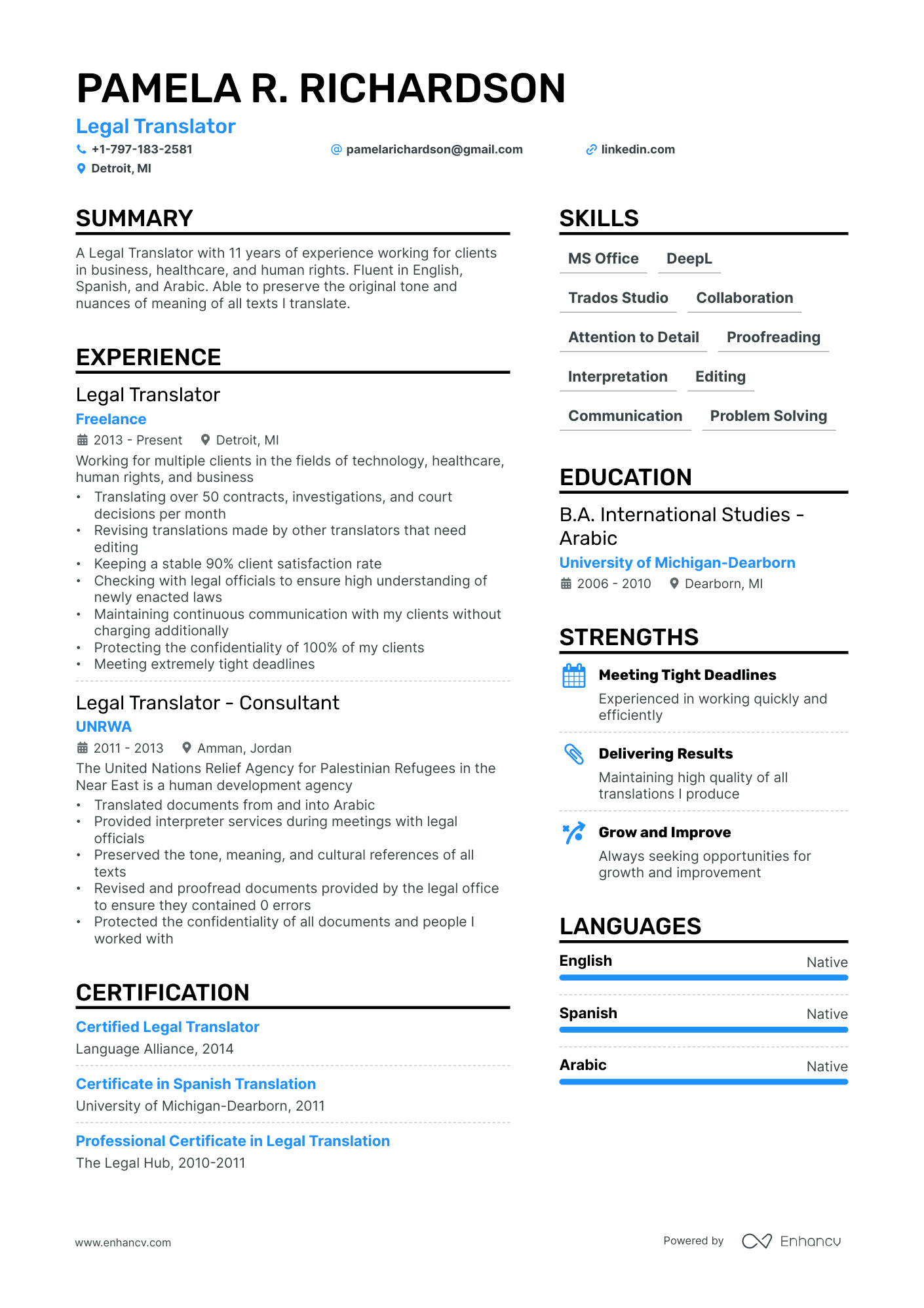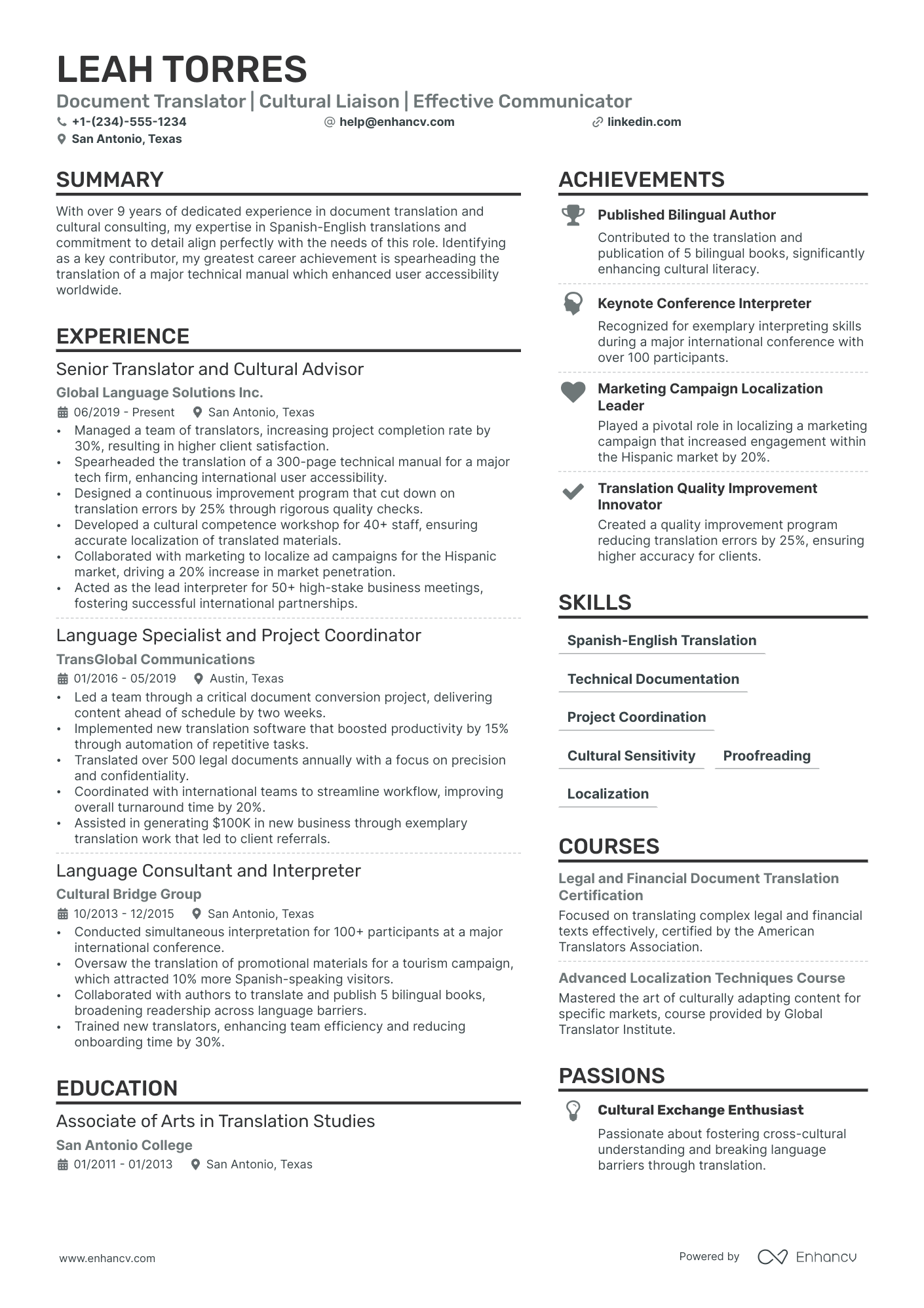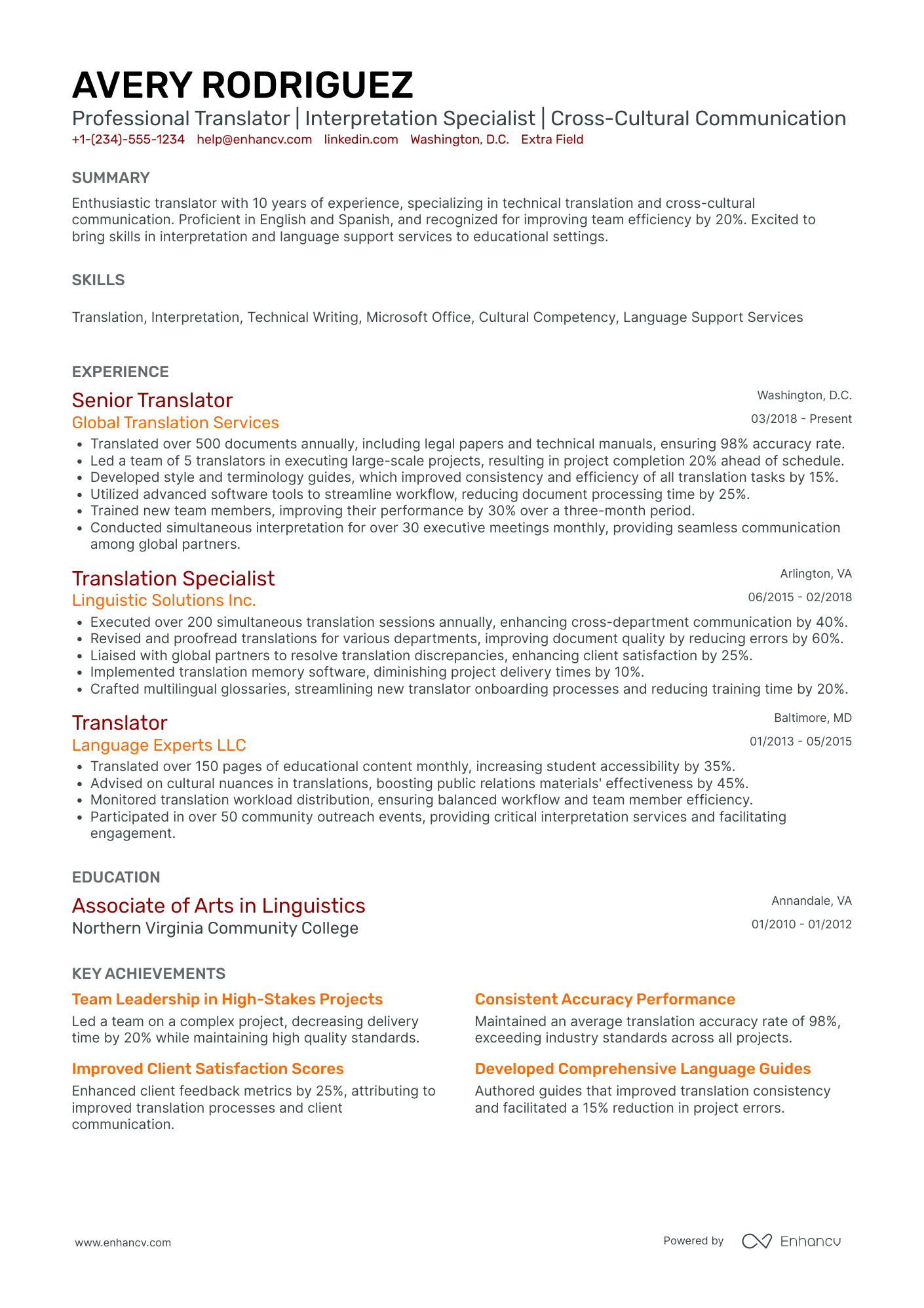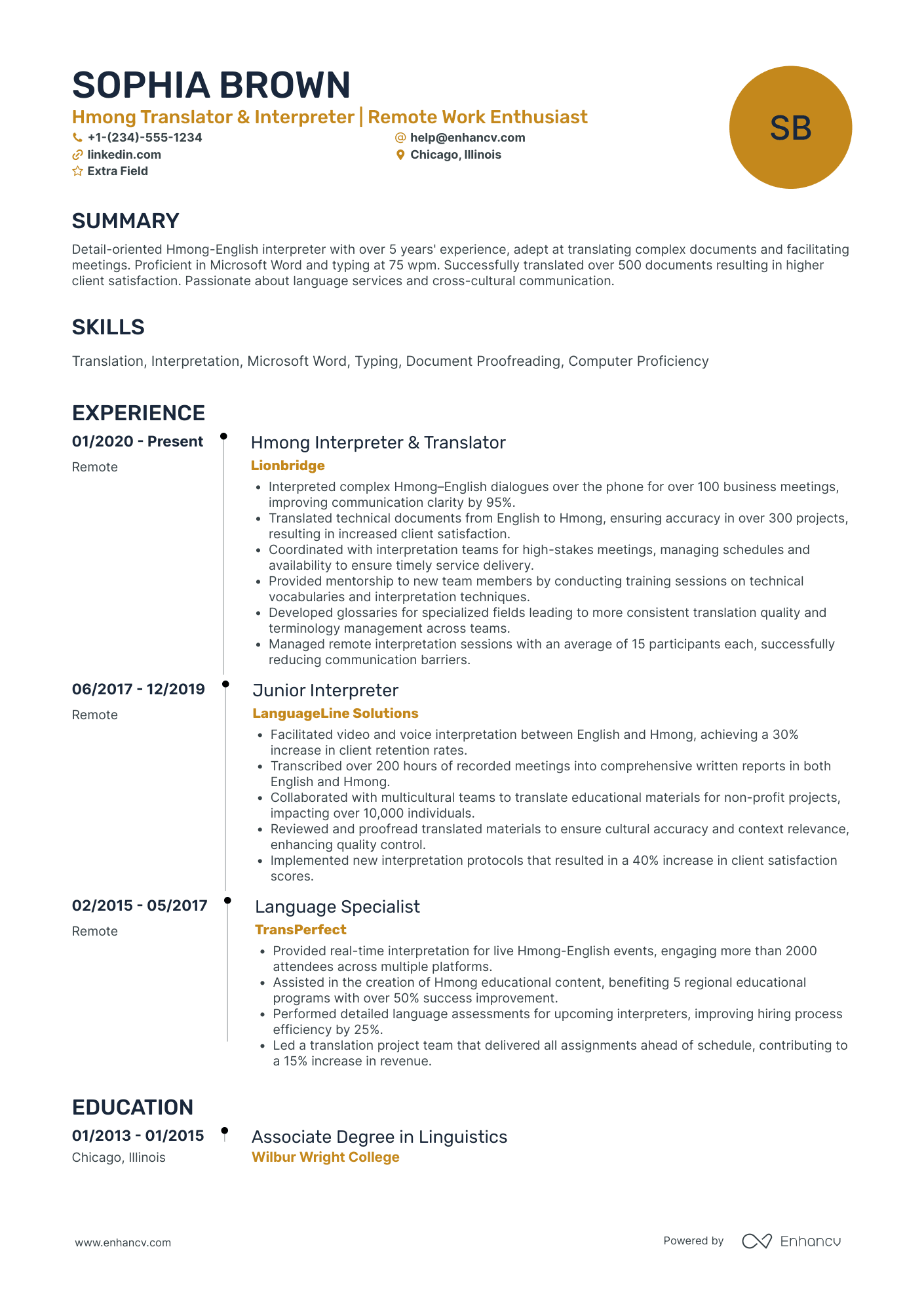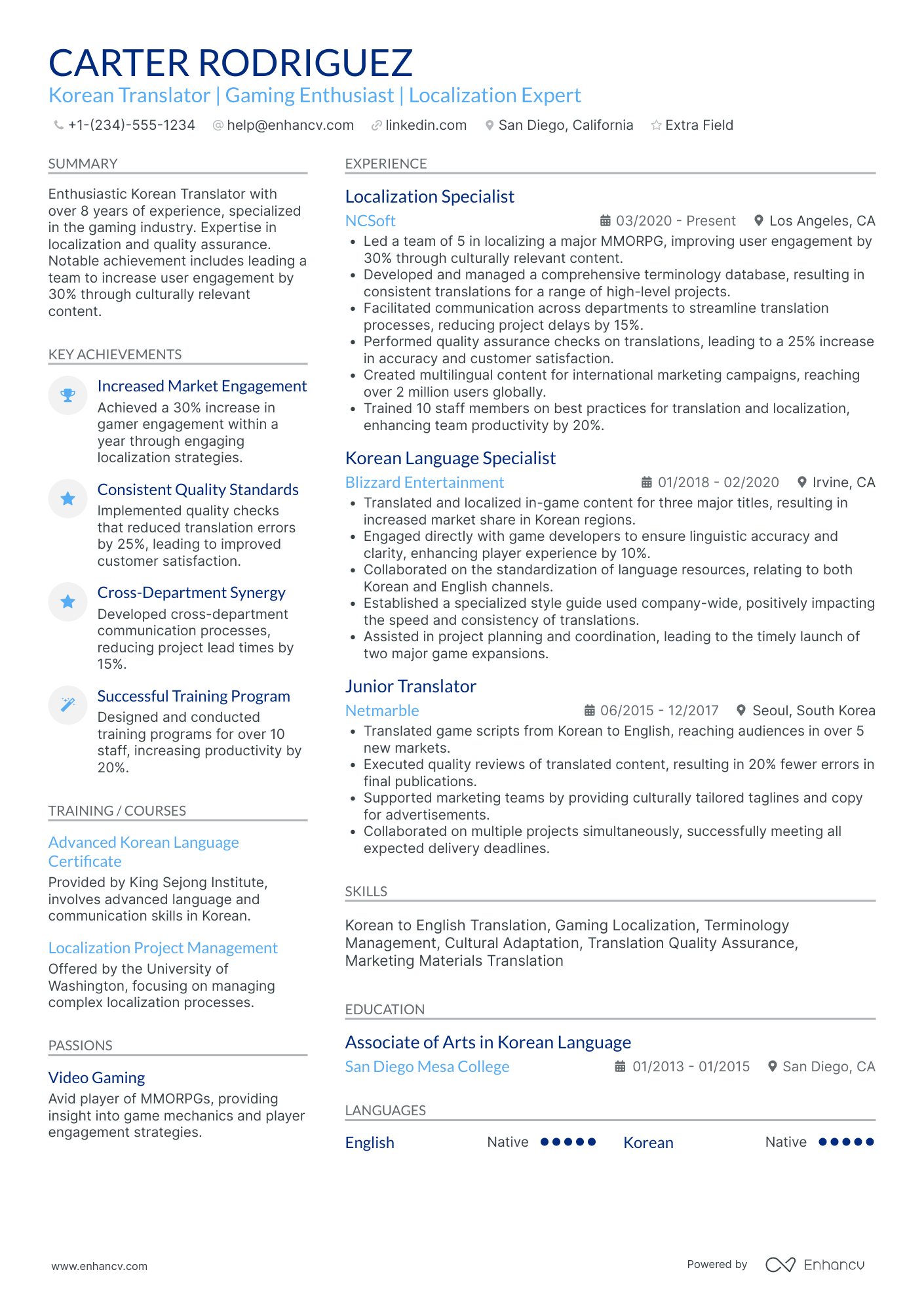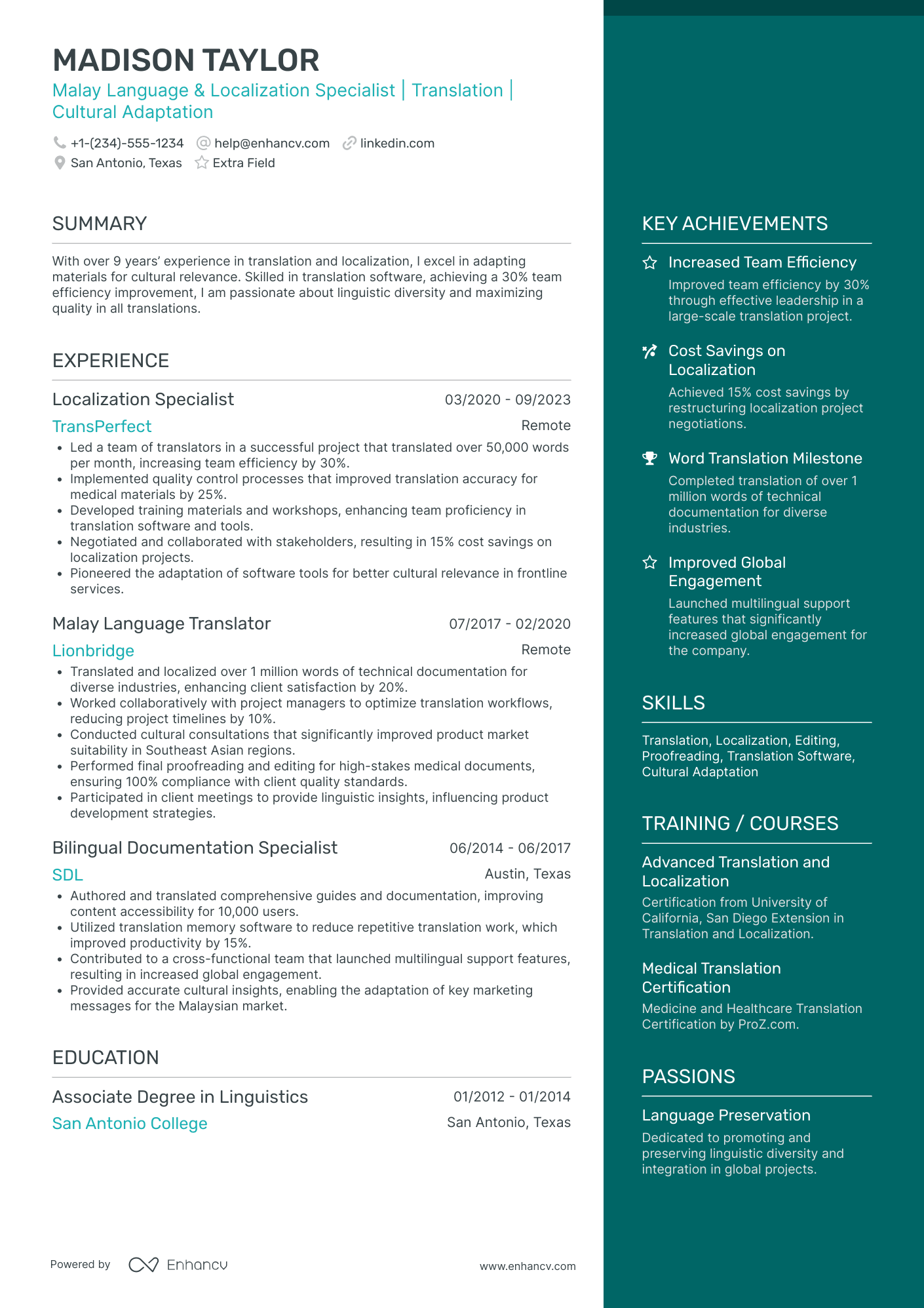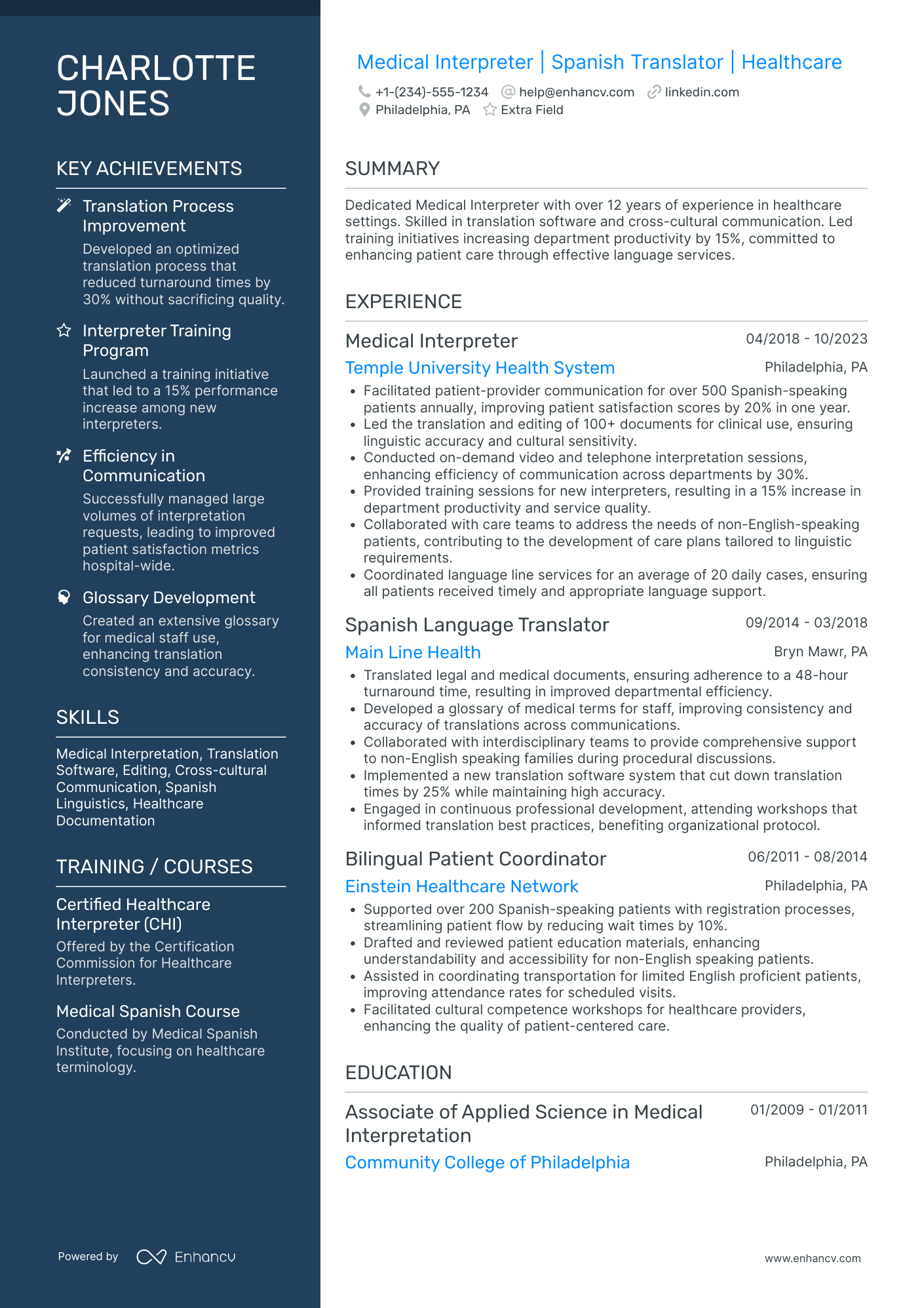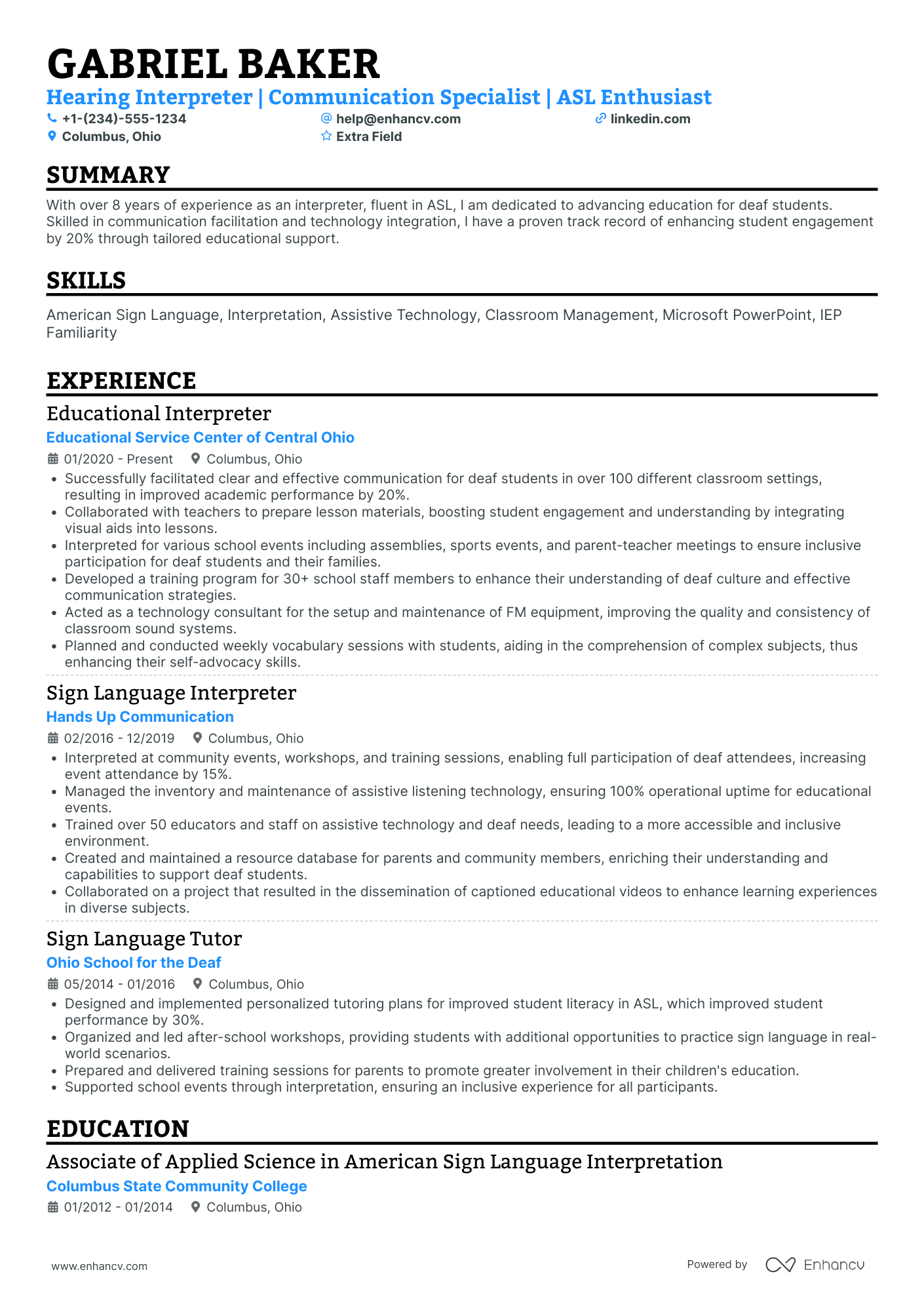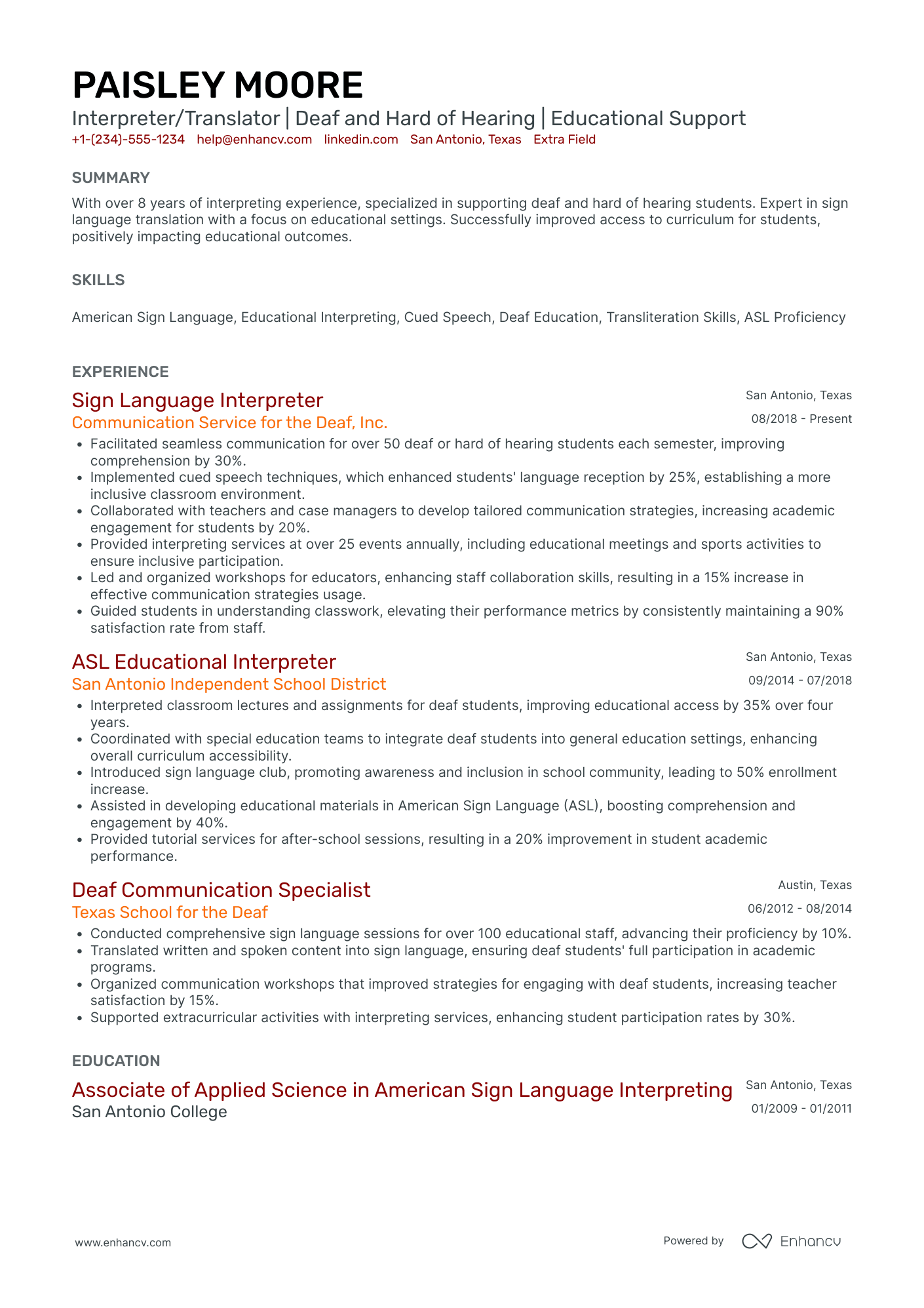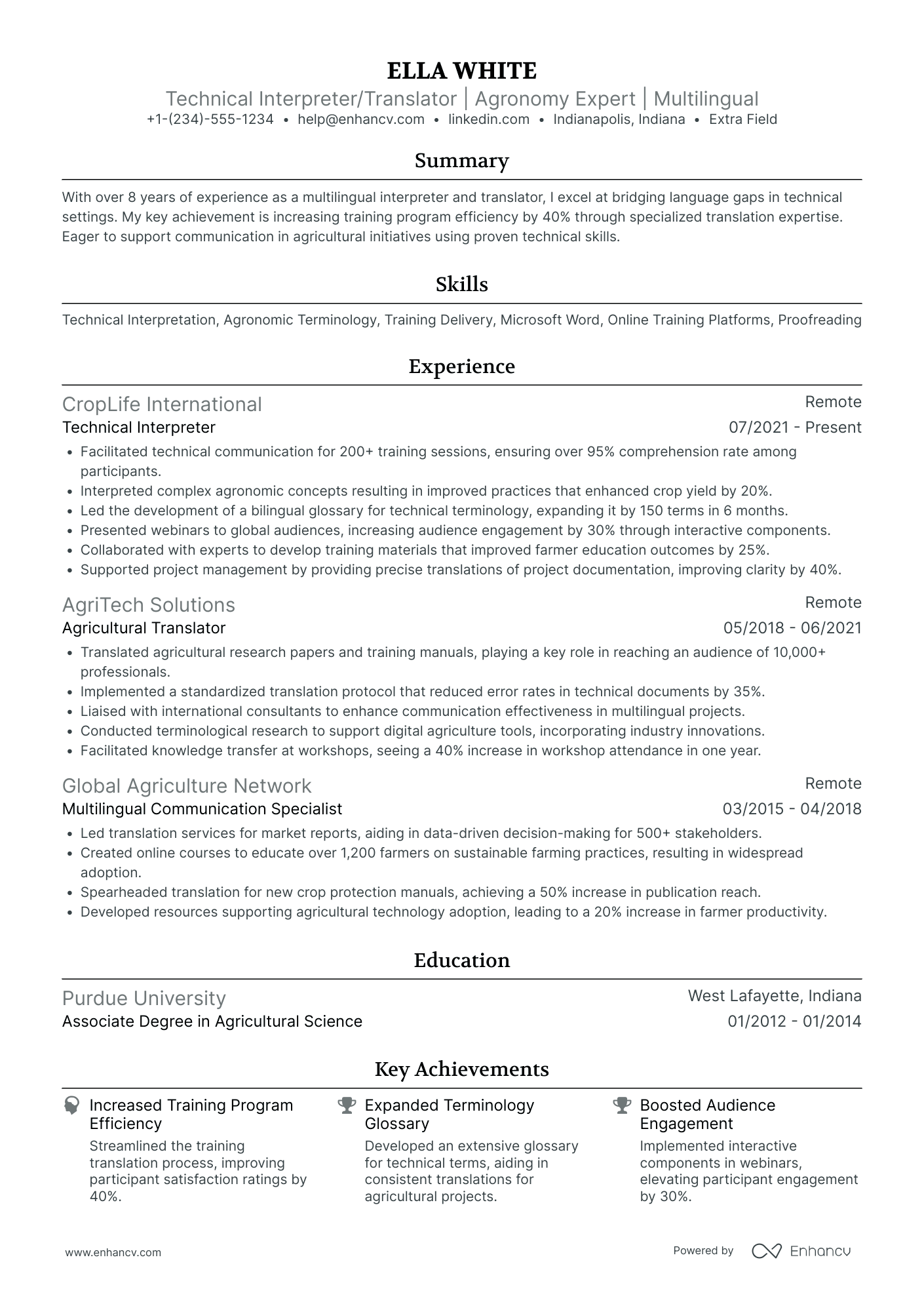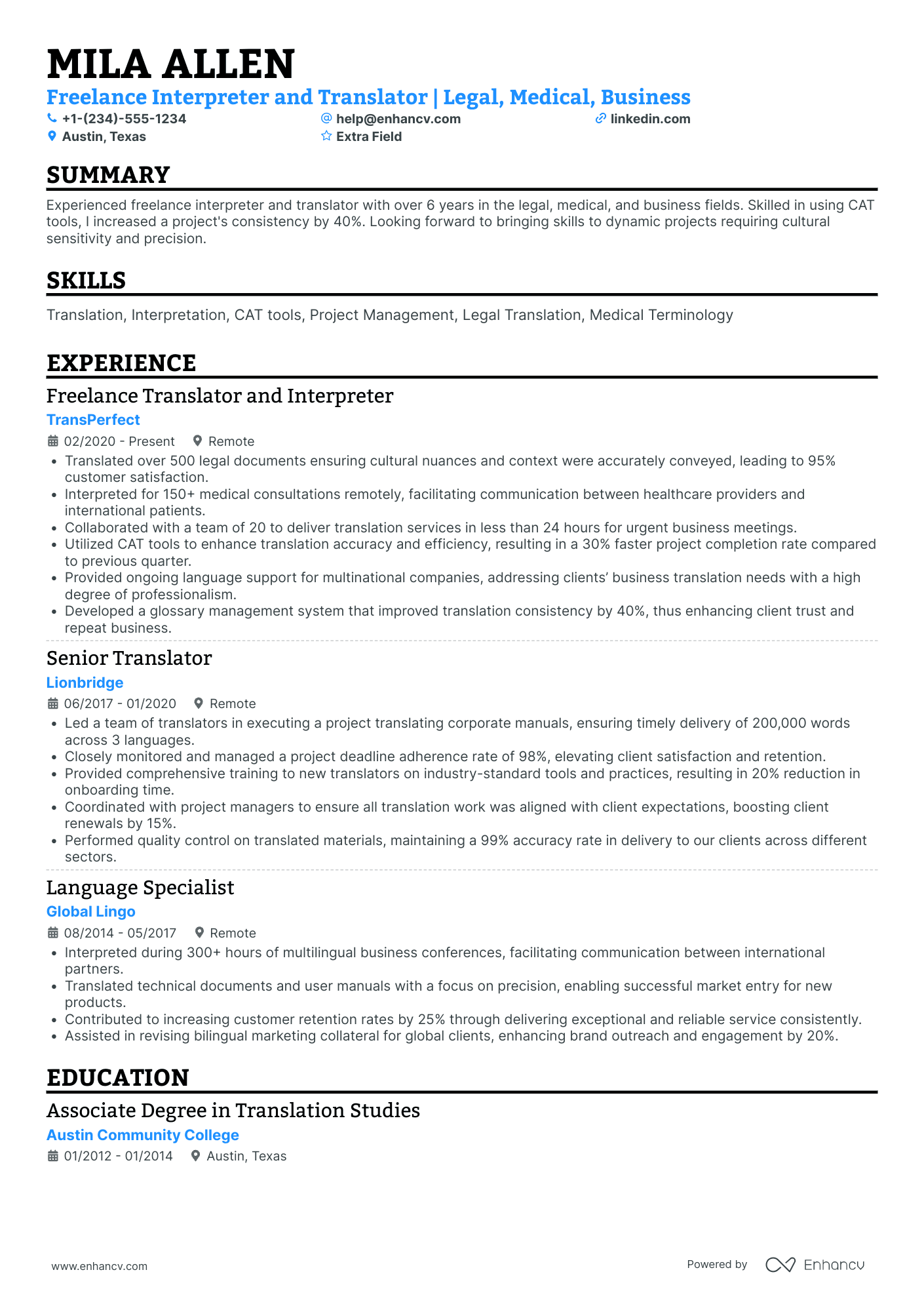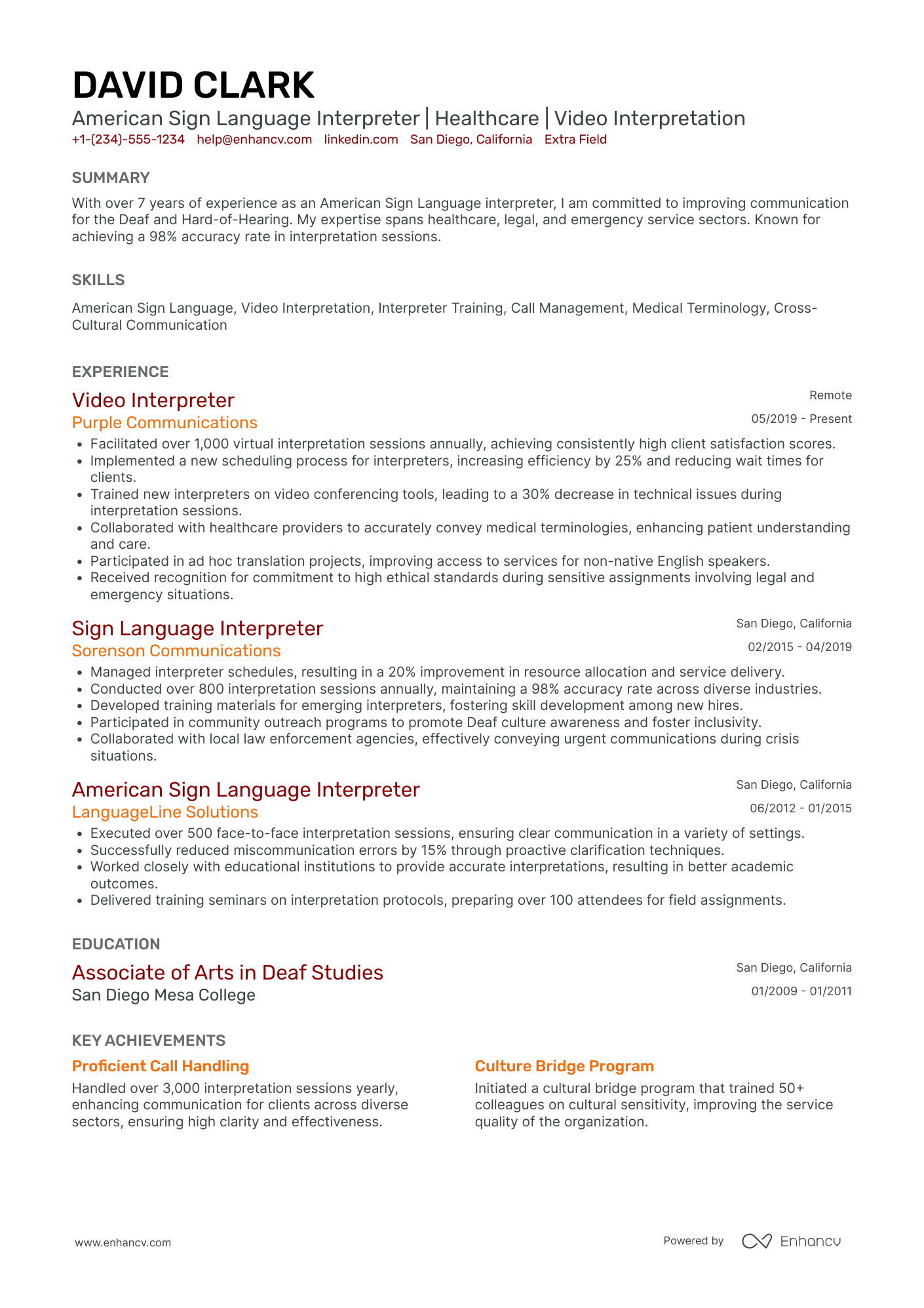According to the US Bureau of Labor Statistics, translator jobs are expected to grow by 4% from 2022 to 2032. While this growth shows a steady demand for language services, the industry’s needs are evolving, especially with the rise of AI. Companies are not just looking for translators who love languages but for skilled cultural experts and content editors who can handle post-editing AI translations.
Despite AI's advancements, human expertise remains crucial due to the technology's limitations and the degree of proofreading required. To be competitive in this changing industry, make sure your resume emphasizes your language proficiency, cultural knowledge, editing skills, and familiarity with technology.
Are you ready to perfect your translator resume? Our guide will help you navigate the key steps to create a standout resume. We’ll help you to:
- Keep your resume clean and ATS-compliant to present yourself as a detail-oriented translator.
- Underline the right skills that will make you stand out, regardless of your career level or situation.
- Include specific examples of your achievements to demonstrate your professional accomplishments in translation.
- Customize your resume to meet the unique requirements of each translation job you apply for.
- Emphasize relevant certifications and your commitment to continuous learning.
- Make sure your resume makes a strong impact, even if you're at the beginning of your translation career.
If the translator resume guide isn’t the right fit for you, check out our other related guides:
Translator resume sample
Looking for an impressive translator resume? View the sample below, or easily create yours with our Enhancv resume builder in just minutes.
Michael Martinez
translator
michael.martinez@translationservices.com | @LinkedIn | New York, NY
Summary
Bilingual translator with over 7 years of experience in translating documents and spoken words from English to Spanish and vice versa. Proven ability to provide clear, accurate, and culturally appropriate translations. Skilled in using CAT tools and adept at meeting tight deadlines without compromising quality. Seeking to leverage expertise in a dynamic translation role.
Experience
translator
ABC Translation Services, New York, NY
June 2018 – Present
- Translate legal, technical, and business documents from English to Spanish and Spanish to English, ensuring accuracy and cultural relevance.
- Collaborate with clients to understand their needs and provide tailored translation services.
- Utilize CAT tools such as SDL Trados and MemoQ to maintain consistency and efficiency.
- Proofread and edit translations to ensure high-quality deliverables.
- Managed multiple projects simultaneously, consistently meeting deadlines.
Freelance translator
Self-employed, Remote
April 2014 – May 2018
- Provided translation services for various clients including publishing houses, legal firms, and corporate businesses.
- Translated a wide range of documents including contracts, manuals, websites, and marketing materials.
- Developed a reputation for delivering high-quality translations on time.
- Built and maintained strong client relationships through effective communication and reliability.
Education
Bachelor of Arts in Spanish
University of California, Los Angeles (UCLA)
Graduated: May 2014
Certifications
- Certified translator - American translators Association (ATA), 2016
- Advanced Spanish Language Proficiency - Cervantes Institute, 2015
Skills
- Translation tools: SDL Trados, MemoQ, Wordfast
- Technical skills: MS Office Suite, Google Suite
- Soft skills: Attention to detail, Time management, Communication, Cultural awareness
Languages
- English (Native)
- Spanish (Fluent)
Let's dive deeper into how to format your resume.
How to format a translator resume
Want a resume that stands out to recruiters? Use these practical tips to organize it:
- Use the reverse chronological format to highlight recent positions and show career growth in translation.
- Opt for a double-column template to create a visually appealing and easy-to-read resume.
- Choose simple fonts like Rubik, Calibri, or Volkhov in sizes 10 to 12 for a clean look.
- For most jobs, a 1-page resume is ideal, but 2 pages are acceptable if you have over 10 years of professional experience.
- Maintain at least 1-inch margins and use accent colors such as gray or blue.
- List your name, phone number, location, professional email address and area of expertise in the header.
- Include your LinkedIn profile link if it’s up-to-date and relevant.
- Save your resume as a PDF to ensure it retains its format on any device.
Different markets have specific resume styles – a Canadian resume, for instance, may require a different approach.
PRO TIP
To make your resume ATS-friendly, use relevant keywords, follow the tips provided above, and skip the photo unless required.
Optimize your resume with our intuitive, free AI resume checker, offering a detailed 16-point evaluation.
Is your resume good enough?
Drop your resume here or choose a file. PDF & DOCX only. Max 2MB file size.
Your experience section reflects your career path. Let's see how to write it.
How to write your translator resume experience
As a translator, you carefully select your words for accuracy and impact. Apply the same selectiveness to your resume. Your experience section should underscore your most relevant translation work.
Here are some ideas on what to include on your translator resume:
- Language pairs: Specify the languages you translated between (e.g., English to Spanish).
- Types of documents translated: Mention the specific types of documents you handled, such as legal, technical, medical, or literary texts.
- Tools and software: List any computer-assisted translation (CAT) tools or software you used, like SDL Trados, MemoQ, or Wordfast.
- Client interaction: Describe your experience working with clients, understanding their needs, and delivering customized translations.
- Volume of work: Indicate the quantity of translation work you completed, such as the number of pages or projects translated.
Freelance work and resume formatting
For translators who do freelance work, listing their experience can be a bit different:
- Freelance experience: Clearly label a section as "Freelance translator" or "Self-employed translator."
- Project-based entries: Instead of traditional job titles, use project names or types (e.g., "Legal document translation for XYZ law firm").
- Client list: If confidentiality allows, include a list of notable clients or industries you have worked for.
- Scope of work: Mention the scope of each project, including languages translated, document types, and tools used.
- Consistent formatting: Keep the format consistent with other sections of your resume to maintain a professional appearance.
Adding numbers and results to your resume will boost its impact by providing solid proof of your achievements. Quantifying your accomplishments makes them more tangible, allowing hiring managers to understand the scale and impact of your work. Metrics are particularly valued when they:
- Tie to business objectives: For instance, "Translated marketing materials that increased international sales by 20%."
- Show your contribution: For example, “Led a translation project that reduced turnaround time by 15%."
Remember, recruiters are looking for reasons to say "yes" to your resume. They value people who get things done, even if not all impactful actions have metrics. Fixing a bug or helping a coworker is significant, though hard to quantify. Be sure to mention these contributions too.
As a translator, you ensure every word conveys the intended meaning and nuance. In the same way, tailoring your resume highlights the skills and experiences most relevant to the job. This targeted approach not only showcases your qualifications effectively but also helps your resume pass through Applicant Tracking Systems that many companies use.
To illustrate this, we’ve provided an actual example of a job posting below for a translator. By crafting our experience entries based on that, you can see how much more effective a targeted resume can be.
Translator
Responsibilities:
- Ability to apply advanced communication skills in English and Spanish
- Accurately translate a wide variety of complex material from source to target language
- Utilize translation software to automate translations
- Identify and resolve conflicts related to the meanings of words, concepts, practices, or behaviors
- Work with a variety of cultural/regional dialects and backgrounds
- Demonstrate high level of proofreading/editing skills
- Suggest methods to update, simplify, and enhance translation processes and procedures
- Work with discretion, maintaining confidentiality and neutrality when applicable
- Adequately prioritize tasks while demonstrating attention to detail and organizational skills
- Working knowledge of Microsoft Office product suite in order to be able to edit and format any type of document
Qualifications:
- Bilingual Spanish/English skills at an Advanced High or Superior proficiency is required for this position
- Candidates must qualify on Spanish and English reading and writing ACTFL proficiency assessments prior to starting the position
- Ability to translate documents into the target language
- Create documents (marketing materials, presentations, spreadsheets, databases, flowcharts) in the target language
- Operate word processing and transcribing equipment
- Demonstrated cultural knowledge of the target language
- Demonstrated ability to speak, read, and write source and target language
- Competitive applicants should have at least 1 or more years of previous work experience in the translation of documents
Here’s an example of an experience section that aligns perfectly with the job description:
- •Translated legal documents between English and Spanish, achieving 98% client satisfaction.
- •Used SDL Trados to streamline processes, improving efficiency by 30%.
- •Proofread and edited for accuracy, reducing errors by 40%.
- •Improved translation methods and procedures, cutting project turnaround time by 20%.
- •Maintained confidentiality and neutrality, ensuring compliance with privacy standards.
- •Formatted documents using Microsoft Office, resulting in a 15% increase in client approval.
This experience section will definitely catch recruiters' attention.
- Demonstrates proficiency: By translating complex materials between English and Spanish with a 98% client satisfaction rate, the candidate shows strong language skills and reliability. This metric highlights the translator's ability to meet client expectations consistently.
- Efficiency in using tools: Utilizing translation software to improve efficiency by 30% highlights the candidate's ability to leverage technology effectively. This demonstrates their capability to handle large volumes of work quickly and accurately.
- Attention to detail: Proofreading and editing to reduce errors by 40% underscores a meticulous approach to ensuring high-quality work. This shows the candidate's commitment to delivering precise and error-free translations.
- Technical skills: Formatting documents using Microsoft Office, resulting in a 15% increase in client approval, showcases proficiency with essential office software and attention to presentation quality. This indicates the candidate's capability to produce professionally formatted documents that meet client standards.
- Quantifiable achievements: Including specific metrics and improvements gives a clear picture of the candidate's impact, making their contributions tangible and impressive to recruiters. This approach helps quantify the value the candidate brings to potential employers.
If you lack work experience, don’t panic. We have some tips to help you stand out.
How do I write a translator resume with no experience
Creating a translator resume without professional experience can be challenging, but you can still make a strong impression by focusing on your skills, education, and relevant activities. Use a functional or hybrid resume format to highlight your abilities. The functional format emphasizes your skills and competencies, making it perfect if you haven't yet built a professional track record. A hybrid format combines functional and chronological elements, letting you showcase your strengths and provide a brief work history overview.
If you're applying for an entry-level translator position, consider these suggestions:
- Education: List your education related to languages, translation studies, or similar fields. Focus on relevant courses, such as linguistics, translation techniques, or cultural studies.
- Internships: Mention any translation-related internships you've completed, whether paid or unpaid. For example, "Interned at XYZ Translation Services, where I assisted with translating legal documents from English to Spanish, ensuring accuracy and cultural relevance."
- Volunteer work: Highlight hands-on translation roles, such as volunteering to translate materials for non-profit organizations. Also, include details about any opportunities where you supervised or tracked the work of others.
- References: Provide references from teachers or mentors if you have them, or note that they’re available upon request.
- Transferable skills: Underline skills that can be applied to the translator role, such as attention to detail, communication, and cultural awareness.
- Objective statement: Write a brief statement that shows your enthusiasm for translation, highlights relevant skills, and outlines your career goals. Keep it to 3 sentences.
PRO TIP
To demonstrate your preparedness for entry-level translator roles, emphasize your educational background and related coursework.
Let's take a closer look at the sample we provided earlier and modify it to better suit an entry-level position. Use a functional or hybrid resume format to emphasize skills and abilities over work history. This is especially useful if you have limited experience. It helps hiring managers quickly see your competencies and enthusiasm for the translation field, even if you’re just starting out.
Michael Martinez
translator
michael.martinez@translationservices.com | @LinkedIn | New York, NY
Objective
Bilingual (English/Spanish) recent graduate with strong communication skills and cultural knowledge. Seeking an entry-level translator position to utilize my language abilities and contribute to effective communication across diverse cultures.
Skills
- Bilingual: English/Spanish
- Excellent written and verbal communication
- Cultural awareness and sensitivity
- Knowledge in translation software (e.g., SDL Trados, MemoQ)
- Strong proofreading and editing abilities
Experience
Volunteer translator
ABC Translation Services, New York, NY
April 2014 – May 2018
- Provided translation services for community events and informational materials.
- Helped translate documents and presentations, ensuring accuracy and cultural relevance.
Education
Bachelor of Arts in Spanish
University of California, Los Angeles (UCLA)
Graduated: May 2014
Certifications
Certificate in Translation Studies
Institute of Linguistics
Awarded: March 2022
Languages
- English (Native)
- Spanish (Fluent)
After listing your experience, the next step is to highlight your key skills. This will help employers see your qualifications clearly.
How to list your hard and soft skills on your resume
Emphasizing skills on a resume for a translator is key to showing qualifications and helping recruiters see your fit for the role. This matches your profile with the job description, boosts your resume's visibility in ATS systems, and shows your value to employers.
Let's focus on hard skills first.
Hard skills
Listing hard skills on a translator's resume is important because it shows your technical knowledge and proficiency in specific tools and technologies.
Create a resume section titled "Hard skills" and place it near the top or below your work experience section. Be specific and relevant by naming tools, software, and methodologies you know well.
Adjust these skills to match the job you're applying for. If you have many hard skills, consider organizing them into different sections for clarity.
Here are some essential translator skills that would significantly benefit your application:
Best hard skills for your translator resume
- SDL Trados Studio
- MemoQ
- Wordfast
- Across
- OmegaT
- MateCat
- Smartcat
- Adobe Acrobat
- Microsoft Office
- Google Translate
- CAT tools (Computer-Assisted Translation tools)
- Subtitling software (e.g., Aegisub)
- Localization tools
- XTM Cloud
- Translation Memory (TM) management
- Terminology databases
- Machine Translation Post-Editing (MTPE)
- Optical Character Recognition (OCR) software
- Multilingual Desktop Publishing (DTP)
Let's now move to soft skills.
Soft skills
Soft skills are crucial for a translator's resume as they demonstrate your ability to handle various situations and interact effectively with clients and colleagues. Instead of listing these skills in a separate section, integrate them throughout your resume.
In your summary or objective, highlight essential soft skills and give specific examples of how you've used them in real-life scenarios, such as managing cross-cultural communication or resolving translation discrepancies.
Also, emphasize relevant soft skills in your work experience and education sections, showcasing your collaboration and adaptability in translation settings. Make sure these skills align with the keywords from the job ad.
Here are some commonly valued soft skills for translators that our research has found.
Best soft skills for your translator resume
- Attention to detail
- Cultural awareness
- Communication
- Multitasking
- Creativity
- Patience
- Time management
- Research skills
- Active listening
- Collaboration
- Critical thinking
- Interpersonal skills
- Organization
- Adaptability
- Creativity
- Customer service
Your education has helped build your skills. Let's perfect the certifications and education section.
How to list your certifications and education on your resume
To become a translator, you typically need at least a bachelor's degree in translation, linguistics, or a related field. Hiring managers often prefer candidates with formal education in a foreign language or a related subject. Some translators have degrees in literature, history, law, medicine, or other areas tied to their specialization. For many government or high-level positions, a master's degree is often required. While a formal degree isn't always mandatory, it significantly enhances job prospects and credibility in the field.
Here's the best way to present the educational background on your translator resume:
- Mention the degree you obtained in translation, linguistics, or a related area.
- Specify the educational institution you attended.
- Include the year you graduated or are expected to graduate.
- Highlight your major, such as translation studies, linguistics, or a particular language.
- Detail any translation certifications you hold, like ATA certification or CTP.
- Note any additional courses or workshops completed that enhance your translation skills, such as advanced language courses or training in translation software.
- List your GPA if it's above 3.5 to showcase your strong academic performance.
This format ensures your education section is clearly outlined for a translator role.
- •Focused on advanced translation techniques and cultural adaptation.
- •Completed a thesis on the impact of regional dialects in translation.
- •Specialized in linguistic theories and language acquisition.
- •Completed a capstone project on the sociolinguistic aspects of bilingualism.
In addition to a degree, acquiring relevant certifications can significantly bolster your credentials as a translator. Highlighting these certifications on your resume showcases your proficiency and commitment to ongoing education. Make sure to:
- Detail each certification you’ve obtained.
- Specify the organization that awarded each certification.
- Include the expiration date if applicable.
Consider these esteemed certifications for translators:
Best certifications for your translator resume
After discussing certifications, let’s turn our attention to writing an engaging resume summary to attract potential employers.
How to write your translator resume summary
Your personal statement is a crucial part of your application as it gives recruiters a quick overview of who you are, your goals, and how you plan to achieve them. For those with experience, a resume summary is recommended over an objective statement, which is more suited for entry-level candidates. For experienced translators, a resume summary is ideal. Keep it brief, around 3 – 5 sentences, and emphasize how your language skills have contributed to previous successes. Use an active voice and tailor your summary to the specific job you’re applying for. Incorporate keywords from the job ad to grab recruiters' attention
Here's a strong resume summary example tailored to the earlier translator job ad. This sample showcases the ideal approach for crafting your professional summary.
This resume summary stands out because it’s:
- Clear and to the point: Summarizes key qualifications and achievements efficiently.
- Engaging: Uses active language and measurable results to showcase skills.
- Tailored to the job: Aligns with the job's requirements for language proficiency, translation accuracy, and cultural knowledge.
Now that we’ve covered the top sections of your translator resume, let's explore additional sections and how to include them effectively.
Optimize your resume summary and objective for ATS
Drop your resume here or choose a file.
PDF & DOCX only. Max 2MB file size.
Additional sections for a translation resume
As an experienced translator, you've likely noticed that sharing personal insights on a resume can enhance a candidate's fit within a company. To make your translator resume more engaging, consider adding these sections to provide recruiters with a comprehensive view of your abilities and character:
- Projects: Describe specific projects that prove your problem-solving and strategic thinking abilities. For instance, “Translated a comprehensive technical manual for a multinational corporation, resulting in a 20% reduction in customer service calls due to clearer instructions.”
- Passions: Mention hobbies and interests like participating in cultural events or engaging in community service to show a well-rounded personality.
- Professional affiliations: Mention your involvement with industry organizations, such as being a member of the American translators Association (ATA), to highlight your strong network and commitment to the field.
- Achievements and awards: Draw attention to your notable accomplishments, such as receiving the "Excellence in Translation Award" for delivering high-quality translation services consistently.
Key takeaways
Just like an accurate translation ensures clarity, a well-crafted resume helps you impress recruiters. When creating or updating your translator resume, keep these points in mind:
- Use specific numbers and achievements to show your impact. Adjust your experience section to fit the job description.
- Mention both hard and soft skills, emphasizing the ones most relevant to the job.
- Detail your educational background in chronological order, mentioning relevant coursework. Emphasize any advanced degrees and professional certifications.
- Underscore your most relevant qualifications, skills, and experiences.
- Add more sections if space allows to make your resume shine.
Translator resume examples
By Experience
By Role
